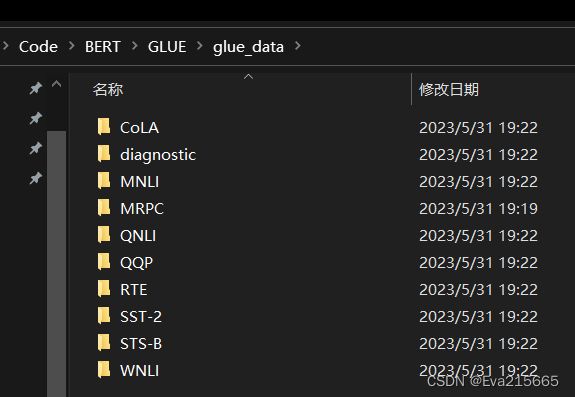BERT在GLUE数据集构建任务
0 Introduction
谷歌开源的BERT项目在Github上,视频讲解可以参考B站上的一个视频
1 GLUE部分基准数据集介绍
- GLUE数据集官网
- GLUE数据集下载,建议下载运行这个download_glue_data.py文件进行数据集的下载,如果链接无法打开,运行下面代码,运行后,会自动下载GLUE数据集到本地项目文件夹中,所包含的数据集有
CoLA,diagnostic,MNLI,MRPC,QNLI,QQP,RTE,SST-2,STS-B,WNLI等,关于这些数据集的详细中文介绍,参考这篇博客,本例是在MRPC数据集上构建任务。 - 关于微软的MRPC数据集:本例中是在MRPC数据集上进行构建的,因为MRPC数据集较小,只有3600多条文本数据,但如下面代码中的注释所说,由于版权问题,不再托管MRPC数据集,需要手动下载。下载方式:首先去官网,下载到
MSRParaphraseCorpus.msi文件,双击安装后,会产生一个文件夹,里面即包含了MPRC数据。
数据集搞定后,文件结构如下图

以下是用于下载GLUE数据集的脚本文件download_glue_data.py,如果下载数据集有困难,可以去百度网盘下载
链接:https://pan.baidu.com/s/1D_AJ_GgWgaPuYbror_jUNg
提取码:9k9r
–来自百度网盘超级会员V4的分享
''' Script for downloading all GLUE data.
Note: for legal reasons, we are unable to host MRPC.
You can either use the version hosted by the SentEval team, which is already tokenized,
or you can download the original data from (https://download.microsoft.com/download/D/4/6/D46FF87A-F6B9-4252-AA8B-3604ED519838/MSRParaphraseCorpus.msi) and extract the data from it manually.
For Windows users, you can run the .msi file. For Mac and Linux users, consider an external library such as 'cabextract' (see below for an example).
You should then rename and place specific files in a folder (see below for an example).
mkdir MRPC
cabextract MSRParaphraseCorpus.msi -d MRPC
cat MRPC/_2DEC3DBE877E4DB192D17C0256E90F1D | tr -d $'\r' > MRPC/msr_paraphrase_train.txt
cat MRPC/_D7B391F9EAFF4B1B8BCE8F21B20B1B61 | tr -d $'\r' > MRPC/msr_paraphrase_test.txt
rm MRPC/_*
rm MSRParaphraseCorpus.msi
1/30/19: It looks like SentEval is no longer hosting their extracted and tokenized MRPC data, so you'll need to download the data from the original source for now.
2/11/19: It looks like SentEval actually *is* hosting the extracted data. Hooray!
'''
import os
import sys
import shutil
import argparse
import tempfile
import urllib.request
import zipfile
import urllib as URLLIB
import urllib.response
import urllib.parse
import io
# from six.moves import urllib
TASKS = ["CoLA", "SST", "MRPC", "QQP", "STS", "MNLI", "QNLI", "RTE", "WNLI", "diagnostic"]
TASK2PATH = {"CoLA":'https://dl.fbaipublicfiles.com/glue/data/CoLA.zip',
"SST":'https://dl.fbaipublicfiles.com/glue/data/SST-2.zip',
"QQP":'https://dl.fbaipublicfiles.com/glue/data/QQP-clean.zip',
"STS":'https://dl.fbaipublicfiles.com/glue/data/STS-B.zip',
"MNLI":'https://dl.fbaipublicfiles.com/glue/data/MNLI.zip',
"QNLI":'https://dl.fbaipublicfiles.com/glue/data/QNLIv2.zip',
"RTE":'https://dl.fbaipublicfiles.com/glue/data/RTE.zip',
"WNLI":'https://dl.fbaipublicfiles.com/glue/data/WNLI.zip',
"diagnostic":'https://dl.fbaipublicfiles.com/glue/data/AX.tsv'}
MRPC_TRAIN = 'https://dl.fbaipublicfiles.com/senteval/senteval_data/msr_paraphrase_train.txt'
MRPC_TEST = 'https://dl.fbaipublicfiles.com/senteval/senteval_data/msr_paraphrase_test.txt'
def download_and_extract(task, data_dir):
print("Downloading and extracting %s..." % task)
if task == "MNLI":
print("\tNote (12/10/20): This script no longer downloads SNLI. You will need to manually download and format the data to use SNLI.")
data_file = "%s.zip" % task
urllib.request.urlretrieve(TASK2PATH[task], data_file)
with zipfile.ZipFile(data_file) as zip_ref:
zip_ref.extractall(data_dir)
os.remove(data_file)
print("\tCompleted!")
def format_mrpc(data_dir, path_to_data):
print("Processing MRPC...")
mrpc_dir = os.path.join(data_dir, "MRPC")
if not os.path.isdir(mrpc_dir):
os.mkdir(mrpc_dir)
if path_to_data:
mrpc_train_file = os.path.join(path_to_data, "msr_paraphrase_train.txt")
mrpc_test_file = os.path.join(path_to_data, "msr_paraphrase_test.txt")
else:
try:
mrpc_train_file = os.path.join(mrpc_dir, "msr_paraphrase_train.txt")
mrpc_test_file = os.path.join(mrpc_dir, "msr_paraphrase_test.txt")
URLLIB.request.urlretrieve(MRPC_TRAIN, mrpc_train_file)
URLLIB.request.urlretrieve(MRPC_TEST, mrpc_test_file)
except urllib.error.HTTPError:
print("Error downloading MRPC")
return
assert os.path.isfile(mrpc_train_file), "Train data not found at %s" % mrpc_train_file
assert os.path.isfile(mrpc_test_file), "Test data not found at %s" % mrpc_test_file
with io.open(mrpc_test_file, encoding='utf-8') as data_fh, \
io.open(os.path.join(mrpc_dir, "test.tsv"), 'w', encoding='utf-8') as test_fh:
header = data_fh.readline()
test_fh.write("index\t#1 ID\t#2 ID\t#1 String\t#2 String\n")
for idx, row in enumerate(data_fh):
label, id1, id2, s1, s2 = row.strip().split('\t')
test_fh.write("%d\t%s\t%s\t%s\t%s\n" % (idx, id1, id2, s1, s2))
try:
URLLIB.request.urlretrieve(TASK2PATH["MRPC"], os.path.join(mrpc_dir, "dev_ids.tsv"))
except KeyError or urllib.error.HTTPError:
print("\tError downloading standard development IDs for MRPC. You will need to manually split your data.")
return
dev_ids = []
with io.open(os.path.join(mrpc_dir, "dev_ids.tsv"), encoding='utf-8') as ids_fh:
for row in ids_fh:
dev_ids.append(row.strip().split('\t'))
with io.open(mrpc_train_file, encoding='utf-8') as data_fh, \
io.open(os.path.join(mrpc_dir, "train.tsv"), 'w', encoding='utf-8') as train_fh, \
io.open(os.path.join(mrpc_dir, "dev.tsv"), 'w', encoding='utf-8') as dev_fh:
header = data_fh.readline()
train_fh.write(header)
dev_fh.write(header)
for row in data_fh:
label, id1, id2, s1, s2 = row.strip().split('\t')
if [id1, id2] in dev_ids:
dev_fh.write("%s\t%s\t%s\t%s\t%s\n" % (label, id1, id2, s1, s2))
else:
train_fh.write("%s\t%s\t%s\t%s\t%s\n" % (label, id1, id2, s1, s2))
print("\tCompleted!")
def download_diagnostic(data_dir):
print("Downloading and extracting diagnostic...")
if not os.path.isdir(os.path.join(data_dir, "diagnostic")):
os.mkdir(os.path.join(data_dir, "diagnostic"))
data_file = os.path.join(data_dir, "diagnostic", "diagnostic.tsv")
urllib.request.urlretrieve(TASK2PATH["diagnostic"], data_file)
print("\tCompleted!")
return
def get_tasks(task_names):
task_names = task_names.split(',')
if "all" in task_names:
tasks = TASKS
else:
tasks = []
for task_name in task_names:
assert task_name in TASKS, "Task %s not found!" % task_name
tasks.append(task_name)
return tasks
def main(arguments):
parser = argparse.ArgumentParser()
parser.add_argument('--data_dir', help='directory to save data to', type=str, default='glue_data')
parser.add_argument('--tasks', help='tasks to download data for as a comma separated string',
type=str, default='all')
parser.add_argument('--path_to_mrpc', help='path to directory containing extracted MRPC data, msr_paraphrase_train.txt and msr_paraphrase_text.txt',
type=str, default='')
args = parser.parse_args(arguments)
if not os.path.isdir(args.data_dir):
os.mkdir(args.data_dir)
tasks = get_tasks(args.tasks)
for task in tasks:
if task == 'MRPC':
format_mrpc(args.data_dir, args.path_to_mrpc)
elif task == 'diagnostic':
download_diagnostic(args.data_dir)
else:
download_and_extract(task, args.data_dir)
if __name__ == '__main__':
sys.exit(main(sys.argv[1:]))
2 下载BERT项目
- 用Git工具从BERT开源项目上把项目完整克隆下来,如何使用Git工具从GitHub或者Gitee上克隆项目,参见这里
- 创建一个用于该项目的虚拟环境,参见这里
- 在该虚拟环境下,下载安装该项目所需的依赖,即
requirements.txt,安装方式,在激活当前虚拟环境的情况下,执行pip install -r D:\Code\BERT\bert\requirements.txt,其中D:\Code\BERT\bert\是requirements.txt所在路径
3. 运行BERT项目
运行run_classifier.py文件,该文件为带参数文件,而且参数较多,传入参数方式有若干种。
1. 方法1
在PyCharm->Edit Configuration->Parameters中输入--task_name=MRPC --do_train=true --do_eval=true --data_dir=../GLUE/glue_data/MRPC --vocab_file=../uncased_L-12_H-768_A-12/vocab.txt --bert_config_file=../uncased_L-12_H-768_A-12/bert_config.json --init_checkpoint=../uncased_L-12_H-768_A-12/bert_model.ckpt --max_seq_length=128 --train_batch_size=8 --learning_rate=2e-5 --num_train_epochs=3.0 --output_dir=../output
2. 方法2
上面都设置好后,即可运行run_classifier.py,大约需要十几秒(一张2080TI的显卡),模型训练结果在保存在预先创建的output文件夹下
遇到的问题
- 下载的BERT项目中,
requirements.txt如下
tensorflow >= 1.11.0 # CPU Version of TensorFlow.
# tensorflow-gpu >= 1.11.0 # GPU version of TensorFlow.
由于直接执行了pip install -r D:\Code\BERT\bert\requirements.txt,因此安装了最新版本的tensorflow==2.11,出现了一大堆API问题,列举2个如下
AttributeError: module ‘tensorflow._api.v2.train‘ has no attribute ‘Optimizer‘-->> 改为tf.keras.optimizers.OptimizerAttributeError: module 'tensorflow' has no attribute 'flags'–>>改为flags = tf.compat.v1.flags.FLAGS
修改后,API问题依旧存在,而且越改越多,隧把创建的虚拟环境删除了,重新创建,修改了requirements.txt如下,安装了GPU版本的tensorflow==1.13.1版本。在选择tensorflow版本时,注意要和自己的CUDA版本对应,如何查看自己的CUDA版本,参考这里
# tensorflow == 1.13.1 # CPU Version of TensorFlow.
tensorflow-gpu == 1.13.1 # GPU version of TensorFlow.